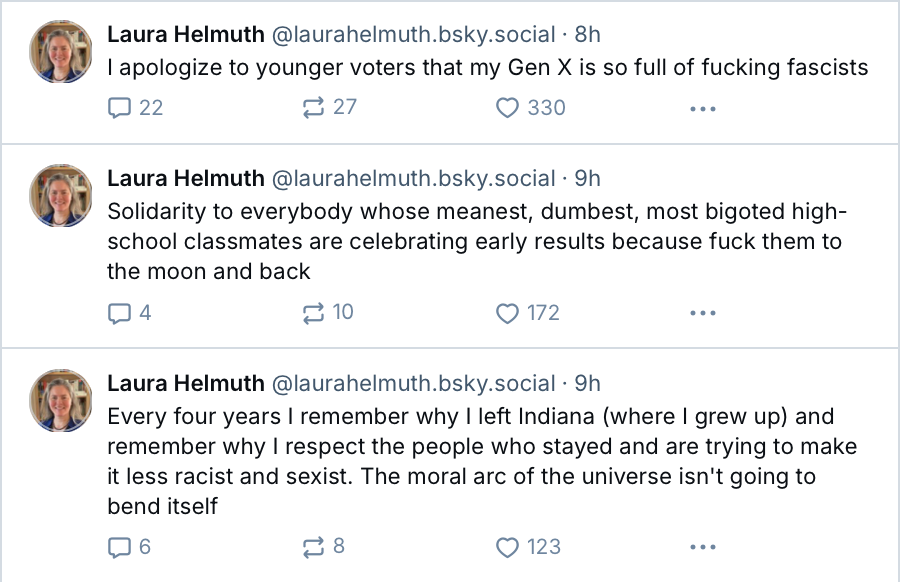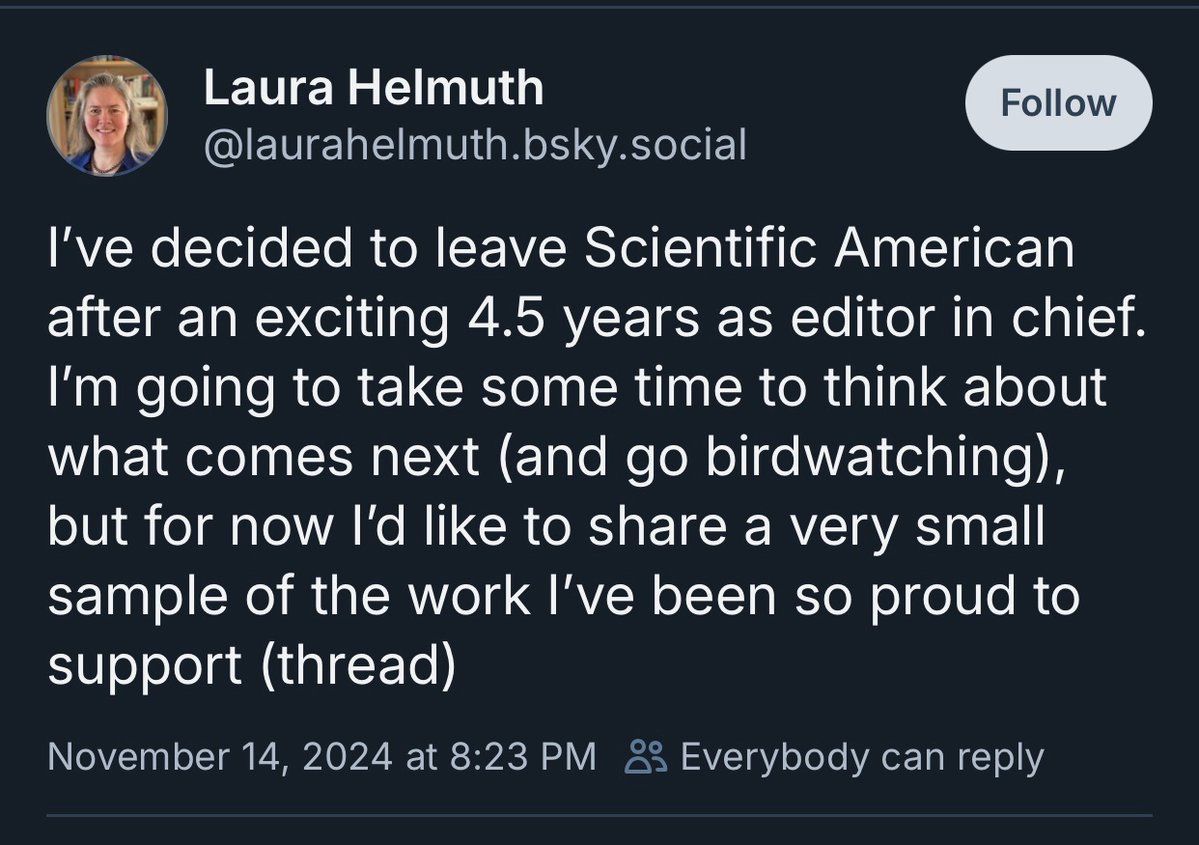The Editor-in-Chief at Scientific American
-
I just dont understand how some people can be "smart" and yet post something "stupid" on the internet.
I predict that the above will soon be deleted, followed by a post about how her account had been hacked!! LOL
-
No, this isn’t all that different than a typical issue of her magazine.
I can’t imagine who’s buying it. They must just survive on library prescriptions.
@jon-nyc said in The Editor-in-Chief at Scientific American:
No, this isn’t all that different than a typical issue of her magazine.
I can’t imagine who’s buying it. They must just survive on library prescriptions.
You're forgetting the dentists.
-
Back a long time ago, if I had some slack time at college, I'd veg out in the library's reading room with a newspaper and a magazine. More often than not, it was Scientific American.
Didn't always understand everything in it, but there was always something interesting to read.
-
@jon-nyc said in The Editor-in-Chief at Scientific American:
No, this isn’t all that different than a typical issue of her magazine.
I can’t imagine who’s buying it. They must just survive on library prescriptions.
You're forgetting the dentists.
@Aqua-Letifer said in The Editor-in-Chief at Scientific American:
@jon-nyc said in The Editor-in-Chief at Scientific American:
No, this isn’t all that different than a typical issue of her magazine.
I can’t imagine who’s buying it. They must just survive on library prescriptions.
You're forgetting the dentists.
Right. But I think precious few are buying it for themselves.
-
Did people stop buying it because it changed, or did it change because people stopped buying it?
-
@jon-nyc said in The Editor-in-Chief at Scientific American:
No, this isn’t all that different than a typical issue of her magazine.
I can’t imagine who’s buying it. They must just survive on library prescriptions.
You're forgetting the dentists.
@Aqua-Letifer said in The Editor-in-Chief at Scientific American:
You're forgetting the dentists.
Brief detour - I drove Mrs. George to the dentist on Tuesday.
There was a basket full of magazines.
-
@Aqua-Letifer said in The Editor-in-Chief at Scientific American:
@jon-nyc said in The Editor-in-Chief at Scientific American:
No, this isn’t all that different than a typical issue of her magazine.
I can’t imagine who’s buying it. They must just survive on library prescriptions.
You're forgetting the dentists.
Right. But I think precious few are buying it for themselves.
@jon-nyc said in The Editor-in-Chief at Scientific American:
@Aqua-Letifer said in The Editor-in-Chief at Scientific American:
@jon-nyc said in The Editor-in-Chief at Scientific American:
No, this isn’t all that different than a typical issue of her magazine.
I can’t imagine who’s buying it. They must just survive on library prescriptions.
You're forgetting the dentists.
Right. But I think precious few are buying it for themselves.
Agreed. I think the same can be said of basically any magazine.
-
https://rogerpielkejr.substack.com/p/how-science-must-change
A minor brouhaha erupted on social media this week when the editor of Scientific American, Laura Helmuth, in a late-night fit of rage, posted profanity-filled and disparaging comments about those who voted for Donald Trump.1 As often happens in social media brouhahas, many are calling for Helmuth to be fired from her role as editor.
However, this is not simply about a highly partisan editor at a magazine and firing her would not address the deeper issues. Rather, this episode reflects how intense partisanship, often accompanied by intolerance and vitriol, have become normalized in areas of science that are especially close to policy and politics. Every day I could point you to social media comments by leading and celebrated scientists that make Helmuth’s diatribe look tame.
Leaders of important scientific institutions — including journals, universities, and academies — have not only condoned partisanship and intolerance, they have often rewarded it.2 Consider actions by the leaders of the most prestigious science journals:
The British journal Nature endorsed Kamala Harris, warning apocalyptically that “the fate of US democracy, science and evidence-based policy hangs in the balance.”
Following the election, Nature framed the comprehensive Republican victory as being in opposition to the global scientific community: “Scientists around the world expressed disappointment and alarm as Republican Donald Trump won the final votes needed to secure the US presidency.”
The editor of Science, Holden Thorp had his own social media brouhaha back in 2023 when he denigrated those among the public with different political views than his:
“[T]hey don't actually want science, they want scientific information they can use as they see fit. This gives people the permission to say things like "climate change may be real, but I don't think we should have government regulation to deal with it," which is unacceptable.”
He left X/Twitter soon after.
When it was revealed in climate scientist Michael Mann’s defamation case that Mann — a blistering political partisan — had spread false rumors accusing a female colleague of sleeping her way to a faculty position and interfering in a journal’s peer review process to prevent a paper’s publication, Thorp simply brushed off this unacceptable behavior: “Passion is not misconduct … It’s perfectly human to react when attacked.”
I could go on (and on and on).3The increasing partisanship among many in leadership roles in the scientific community is well understood. For example, a 2022 study of campaign donations by U.S. scientists found — coincident with Trump’s first candidacy — a sharp increase in donations to Democrats and decrease to Republicans:
Analysis of the FEC data confirms that American scientists who donate to political candidates favor Democratic candidates and organizations over Republican ones. In fact, they do so dramatically. However, this is a relatively recent phenomenon. From 1984–2000, the proportion of donations to Republicans among all university and college employees was fairly stable, at around 40 percent. Academic employees favored Democrats, but only slightly. (Data are not available to separately analyze scientists vs. other academic employees before 2002.) But, from 2000–2021, donations to Republicans fell drastically, to less than 10 percent (Fig. 1). Starting in 2016, professors gave even less to Republicans than did university employees overall, with only about 5 percent of donations from the professoriate going to Republicans. Ivy League professors gave less still—about 2 percent. The total dollar value of aggregate donations increased dramatically in 2019, when academic donations to Republicans were at a recent historic low. Thus, we can observe that in the past 3 years, academic scientists’ giving has gone almost entirely to Democratic candidates.
I have no doubt that the comments by Helmuth and Thorp about those Americans who voted for Donald Trump represent their deeply and sincerely held views against their fellow citizens. Climate scientist Mann goes further and often invokes the language of war against his fellow citizens.
We too must choose to do battle against the forces of darkness, fighting back against a malevolent movement that represents fascism, authoritarianism, racism, misogyny, and bigotry, a movement that uses antiscientific disinformation as its preferred weapon.4 We do this not because our success is guaranteed. Given the forces mobilized against us, we are clearly the underdog.
I cite Mann not because he is an outlier in the scientific community, but because he is so representative of many who hold positions of leadership and authority — not to mention his blissful unawareness of how offensive his daily public rants are to those who do not share his extreme politics.5
There are an enormous diversity of political views across the United States, on the left and on the right. There is absolutely nothing wrong with any scientist holding extreme political views or expressing them in public — It is a free country, and I support all who wish to participate in public debates and discussions.
The larger issue is that the scientific community has chosen to elevate into leadership positions many scientists who oppose and even denigrate the majority of fellow Americans who voted Republican in 2024. At the same time, the scientific community has ostracized and cast off from their own ranks those perceived to deviate in their views even a small amount from this orthodoxy.6 Among some scientists, there is even a view that the scientific community is part of “the resistance” against their fellow citizens.7
-
Trump has ushered in a terrifying regime where blatant hatred of half the country has become shameful. I don’t know where this ends, but it is terrifying.
-
https://reason.com/2024/11/18/how-scientific-americans-departing-editor-helped-degrade-science/
When Scientific American was bad under Helmuth, it was really bad. For example, did you know that "Denial of Evolution Is a Form of White Supremacy"? Or that the normal distribution—a vital and basic statistical concept—is inherently suspect? No, really: Three days after the legendary biologist and author E.O. Wilson died, SciAm published a surreal hit piece about him in which the author lamented "his dangerous ideas on what factors influence human behavior." That author also explained that "the so-called normal distribution of statistics assumes that there are default humans who serve as the standard that the rest of us can be accurately measured against." But the normal distribution doesn't make any such value judgments, and only someone lacking in basic education about stats—someone who definitely shouldn't be writing about the subject for a top magazine—could make such a claim.
Some of the magazine's Helmuth-era output made the posthumous drive-by against Wilson look Pulitzer-worthy by comparison. Perhaps the most infamous entry in this oeuvre came in September 2021: "Why the Term 'JEDI' Is Problematic for Describing Programs That Promote Justice, Equity, Diversity and Inclusion." That article sternly informed readers that an acronym many of them had likely never heard of in the first place—JEDI, standing for "justice, equity, diversity, and inclusion"—ought to be avoided on social justice grounds. You see, in the Star Wars franchise, the Jedi "are a religious order of intergalactic police-monks, prone to (white) saviorism and toxically masculine approaches to conflict resolution (violent duels with phallic lightsabers, gaslighting by means of "Jedi mind tricks," etc.)"
You probably think I'm trolling or being trolled. There's no way that actual sentence got published in Scientific American, right? No, it's very real.
More at the link describing how SciAm lives in an ideological bubble - taking at face value what some activists say without a hint of scrutiny.

